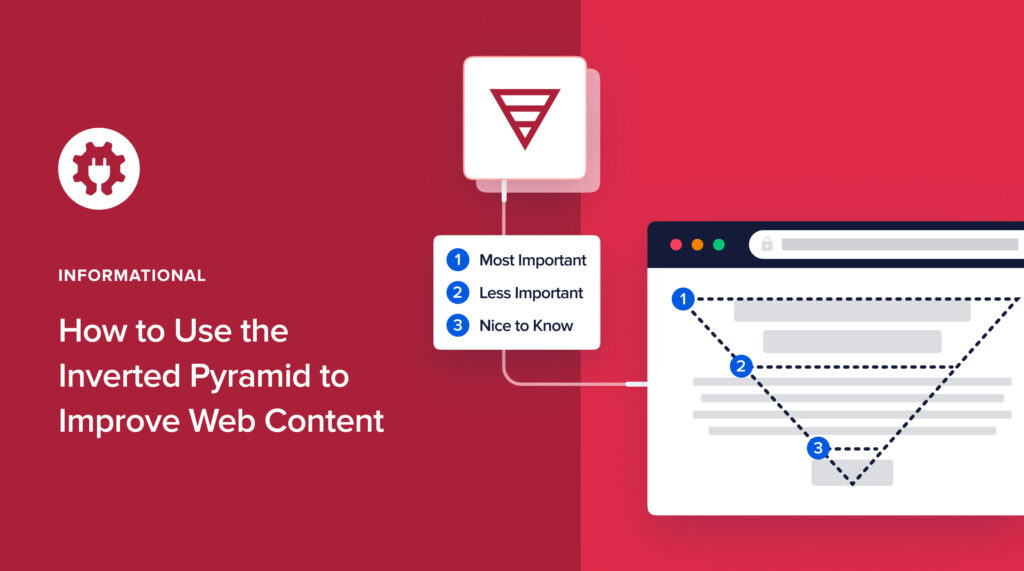Looking for a simple definition of inverted pyramid style?
The inverted pyramid is popular not only in news reporting but also in digital content. It’s considered an effective way to boost engagement.
In this article, you’ll get an introduction to the inverted pyramid and learn how to use it to structure your content.
In This Article
What is the Inverted Pyramid?
The inverted pyramid is an approach to writing that places the key points at the beginning.
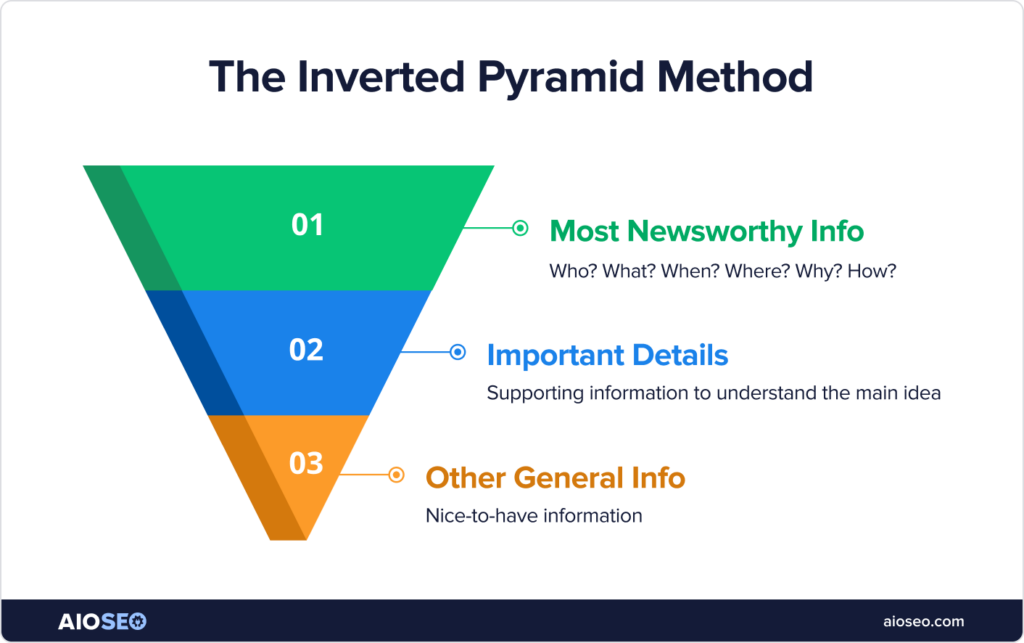
Used for decades in news writing and television reporting, the inverted pyramid makes it easy for readers to quickly grasp “What’s important?” and decide whether they want to read further.
Reporters often place the 5W and H at the top of the pyramid: Who, What, When, Where, Why, and How.
Not Just for Journalism
But the inverted pyramid is used outside of journalism, too, including in press releases and online articles.
Ever since research showed that most users scan web pages rather than reading them word-for-word, the inverted pyramid has become more prevalent in digital content.
With access to vast information, scanners want to quickly determine if the page they’re on is worth reading.
And since many site visitors don’t scroll down, publishers must strategically use the top of the page.
The term “above-the-fold” refers to the portion of a web page that’s visible without scrolling down. This term was borrowed from newspapers and is often synonymous with the inverted pyramid’s top.
Benefits of the Inverted Pyramid
The inverted pyramid provides several online benefits.
- Supports scanning: Viewers can instantly see if the content matches their purpose.
- Provides options: Category links at the top provide alternative but related content.
- Easier read: Logical, scannable formatting makes the page easier to read.
- Supports goals: Put your most important link at the top so users can act on your goal.
Inverted Pyramid Style Examples
The Nielsen Norman Group (NN/g), which has pioneered research into how users read online, recommends using the inverted pyramid.
Each NN/g blog post begins with a concise summary.

We get a clear idea of what the article covers. And we have 3 links we can click if we decide we don’t want to scroll.
The article title is front-loaded with the central idea: “How People Read Online.”
Here’s another example, from a Reuters news story.

- The title itself contains Who, What, Where, When and How.
- And we see the article is a “4 minute read,” which was “Last Updated 29 minutes ago.”
Below the headline is a bullet-point summary.

It would be possible to read the headline and summary and get the gist of the story.
Some websites highlight summaries with the initialism TLDR (or TL;DR), which stands for “too long, didn’t read.” This initialism first became popular in user comments and was later adopted by some publishers.
Now, let’s look at how to use the inverted pyramid.
Using the Inverted Pyramid in Writing
As you create your article outline, determine your key points.
Then, sort the main content (below the top of the inverted pyramid) from most important to least important. Here, it helps to understand what’s most important to your reader.
To get an idea of this, do a Chrome Incognito search for your topic (focus keyword). Page 1 of search results will provide clues to questions that readers have about the topic.
Next, identify whatever is most surprising or unusual in your article. Placing that information at the top can draw readers in.
The Inverted Pyramid Top
Content creators may want to create a standardized approach for what’s included in their pyramid top and how it’s formatted.
Here are some options to include.
- Summary: Consider placing a summary at the top that contains the key points.
- Why should I care? Make sure the content at the top answers this question.
- What’s surprising? Include whatever is most surprising or unusual at the top.
- Topic links: Category/tag links can provide alternatives for users.
- Critical link(s): Want the reader to take action? Include an action link at the top.
The critical link is related to your goal for the article. Some examples of link goals are:
- Sign an online petition
- Download an ebook
- Click to a product page.
A news article’s first sentence or first paragraph (lead paragraph) is called the lede.
Below the Top
The pyramid top is followed by details, sorted in descending order of importance.
To maintain engagement, make your content
- Concise: Omit unnecessary words.
- Scannable: Follow these principles for formatting.
- Credible: Provide sources for facts and statistics.
Images or videos used should provide helpful information to readers. Likewise, charts, diagrams, tables, or interactive visualizations can communicate details.
How to Improve Readability and SEO
Readability makes your content easier to engage with, and SEO attracts users to your web pages.
The combination of both can set your website apart and increase conversions.
Download the All in One SEO (AIOSEO) Plugin
This is where the All in One SEO (AIOSEO) plugin comes in. It analyzes your web content and scores it for readability and SEO.
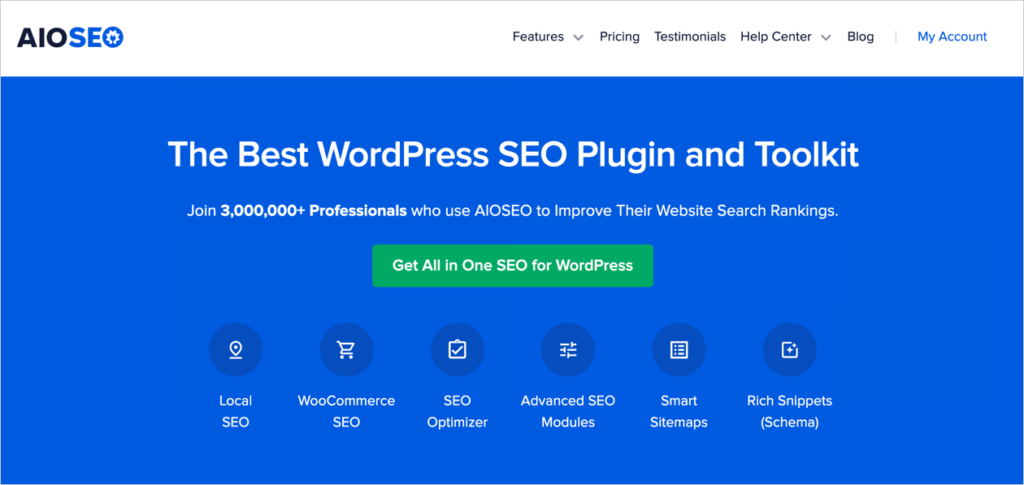
More importantly, it shows you what needs to be improved on a page, and exactly how to do it. So, you’ll learn SEO by doing it.
All in One SEO (AIOSEO) is an established plugin with thousands of 5-star reviews on WordPress.org. And over 3 million people are using the plugin.
Improve Readability
Curious how this works? Once you’ve downloaded and installed All in One SEO (AIOSEO), you can navigate to any page to see the plugin’s recommendations.
The readability and SEO recommendations appear in a right-hand sidebar.
Let’s click Readability to find suggestions.
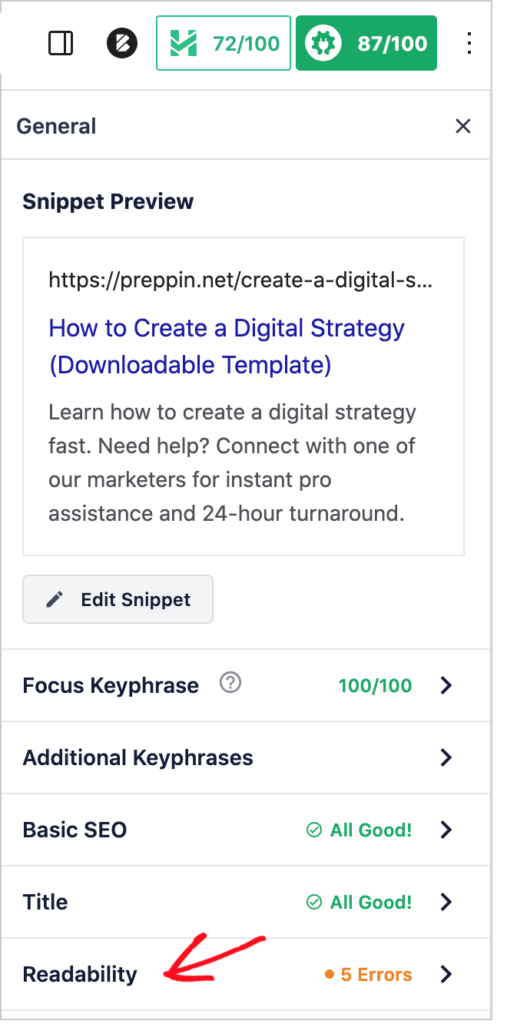
That will open a checklist.
Here we see what we’re doing well.

Caption: Using short paragraphs and sentences, and breaking up long text passages with relevant media, can make content more engaging and easier to read on screens.
And what we need to improve.
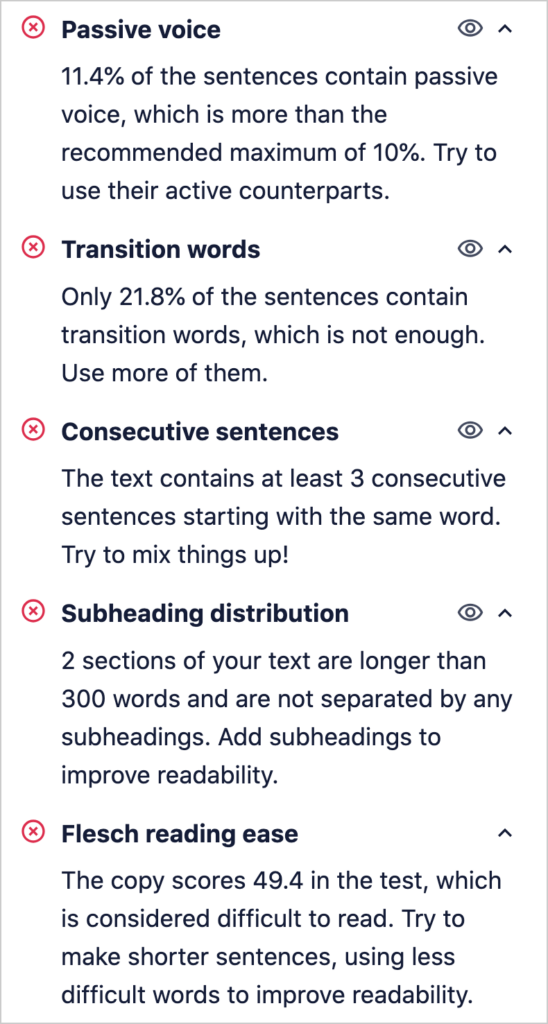
Find Issues Quickly
Most of AIOSEO’s Readability items display an eye icon.
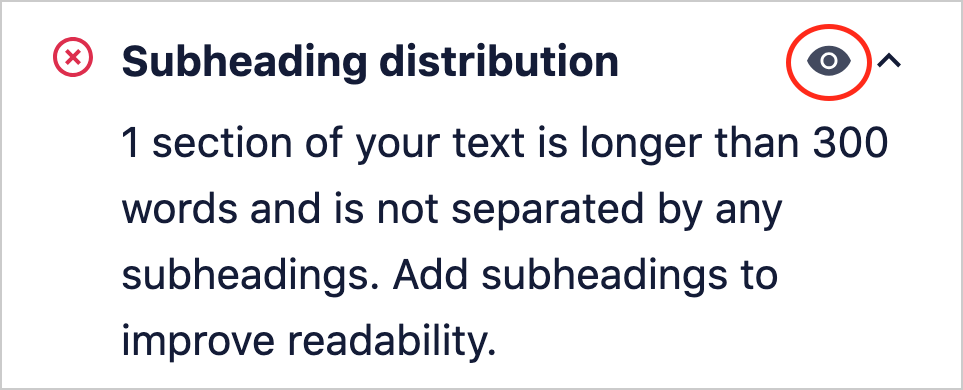
Click on that, and the item that needs fixing will be highlighted in blue.
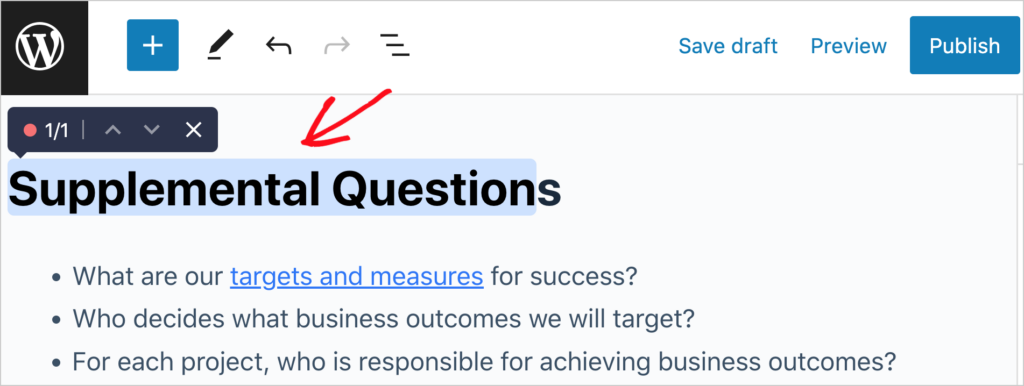
This makes it easy to find the location of what needs fixing.
Increase Your SEO Score
Acting on your Readability items increases your SEO score, visible at the top right of the sidebar.

You’ll get a separate checklist for search engine optimization items.
Take action on the SEO recommendations, and your score will increase more.
Q&A on the Inverted Pyramid Style
Who invented the inverted pyramid writing style?
The inverted pyramid writing style developed from the invention of the telegraph, according to Chip Scanlan in his book Reporting and Writing: Basics for the 21st Century. Because the telegraph was expensive to use, reporters had to reduce messages to essential points and transmit the most important information first.
Is the inverted pyramid style appropriate for all forms of writing?
No, the inverted pyramid style is not appropriate for all forms of writing. For example, narrative nonfiction draws readers along with elements of surprise and often conceals what’s most surprising until the end.
There are many types of writing, from academic to legal to fiction, and many types of potential formats. The inverted pyramid style is most common in news stories and government and commercial content aimed at a broad audience.
Recap: Inverted Pyramid Style
Front-loading your main points supports the scanning behavior that most web users engage in.
The inverted pyramid style of writing can also capture a reader’s attention and engage them.
And separating supporting information from your most important points also helps you structure the article for easy screen reading.
Leaving the least important information to last supports conversions, too. This is because most web users don’t scroll to the bottom of a page.
So, place your call-to-action or critical links near the top. Remember, these items should be considered essential information. And they can be attention-grabbing too.
Resources on Writing for the Web
- George Orwell’s 6 Rules for Writing
- How to Create Scannable Content
- How to Use the Flesch Reading Ease Score
- How to Use Buyer Types to Improve Web Content
- Keyword Difficulty in SEO: What is it and How to Use it
- SEO Secrets Used by the Pros to Grow Revenue
What’s Next?
We hope this post helped you understand the inverted pyramid method, why its use grew beyond news outlets, and why it’s useful in capturing today’s short attention spans.
Next, explore our copywriting tips and our SEO guide to scannable content. The latter provides some fascinating research on how formatting content impacts screen reading. Then be sure to prepare to capture leads.
Subscribe to our YouTube Channel. You’ll enjoy the straightforward WordPress tutorials. You can also follow us on Twitter, LinkedIn, or Facebook to stay in the loop.
Disclosure: Our content is reader-supported. This means if you click on some of our links, then we may earn a commission. We only recommend products that we believe will add value to our readers.
